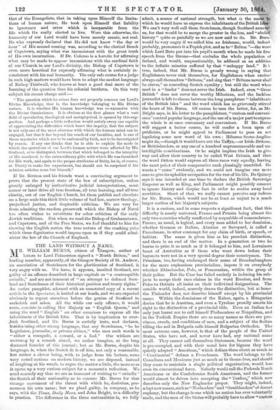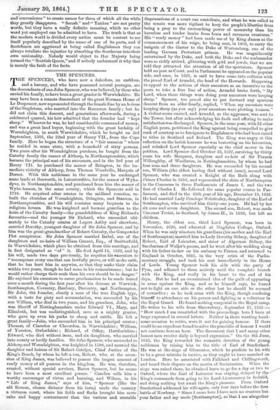THE LAND WITHOUT A NAME.
WILLT A M BURNS, citizen of 441asgow, author of itt letters to Lord Palmerston signed a "North Briton," and leading member, apparently, of the Glasgow Society of St. Andrew, an association of Scotchmen for the glorification of Scotland, is very angry with us. We have, it appears, insulted Scotland, are guilty of an offence described in large capitals as "a contemptible swindle," and are not innocent of "an attempt to defraud Scot- land and Scotchmen of their historical position and treaty rights." An entire pamphlet, adorned with an annotated copy of a recent article in the Spectator, is hurled at our heads, and we are expected obviously to repent ourselves before the genius of Scotland in sackcloth and ashes. All the while our only offence, it would seem, consists in calling Her Majesty' an "English Queen," and using the word "English" on other occasions to express all the inhabitants of the British Isles. That is by implication to over- .look Scotland, and Mr. Burns is awfully irate, and declares, besides using other strong language, that any Scotchman, "be he Legislator, journalist, or private citizen," who uses- such words is "either a renegade, a coward, or a fool." Our withers are unwrung by a remark aimed, we rather imagine, at the long deceased founder of this journal ; but as Mr. Burns, despite his language, is, when the Scotch fit is off him, not only a reasonable, but rather a clever being, with, to judge from his lecture, some very sound notions on modern history, we are disposed, instead of laughing at his wrath, to argue the matter a little, the more so as it opens up a very curious subject for a moments reflection. We need scarcely say that we are as innocent of wishing to " swindle " the Scotch of their nationality as to censure Mr. Burns for that strange movement of the throat with which he, doubtless, pro- nounces his own name; but we plead guilty, in company, as he says, with the limes, Daily News, and John Bright, to a difficulty in practice. The difference in the three nationalities is, we fully admit, a source of national strength, but what is the wake b■ which he would have us express the inhabitants of the British Ides ' We can't very well call them Scotchmen, though Scotland annexe us, for that would be to merge the greater in the less, and "abolisl history" quite as painfully as we are now said to do. Mr. Burn: would be very angry if we called him an Irishman, would, indeed probably, pronounce it a Popish plot, and as to "Briton "—the word which Lord Bute put into his pupil's mouth when he made his fires speech from the throne—that excludes the whole population of Ireland, and would, unquestionably, be adduced as an addition to the infinite miseries suffered by that "unhappy land." It i true, indeed, that Mr. Burns is grossly wrong in saying that Englishmen never sink themselves, for Englishmen when excited always call themselves "Britons," and sing that "Britons never shall be slaves," so conceding Scotch equality ; but still the word when used in a " leader " does not cover the Irish. Indeed, even "Great British" does not cover the worthy Milesians, and the luckless journalist is left to choose between the long paraphrase "inhabitants of the British Isles" and the word which has so grievously stirred the heart of Mr. Burns. Of course he uses the latter, for, as Mr. Bright says, in his letter to the pamphleteer, "custom and conveni- ence" control popular language, and the use of a major part to expres.- the -whole is at once customary and convenient. If Mr. Burns will suggest a better course, he will confer a boon upon all publicists, or he might appeal to Parliament to pass an act legalizing some new word of his own ; Hibernia- Scoto-Anglian might do,—though it would leave out the Taffys,—or Irish-Britons, or Brittislanders, or any one of a hundred unpronounceable and un- intelligible combinations. Or he might implore the Irish to give way and allow their country to be called West Britain, and then the word Briton would express all three races very equally, leaving the moot point of their comparative rank pleasingly unsettled. He wants a " cause " evidently, and we could not imagine one more sure to give its upholder occupation for the rest of his life. De Quincy says it was intended at one time to declare the British Sovereign Emperor as well as King, and Parliament might possibly consent to ignore history and despise fact in order to soothe away local acerbities. Short of that, we really cannot perceive any redress for Mr. Burns, which would not be at least as unjust to a much larger section of her Majesty's subjects.
It is a curious, and in some respects a significant fact, that this difficulty is nearly universal, France and Prussia being almost the only two countries wholly unaffected by a squabble of nomenclature. France, as usual, is logical, and every man added to her dominion, whether German or Italian, Alsatian or Savoyard, is called a Frenchman, in utter contempt for any claim of birth, or speech, or habitat. The name is given him as his proudest distinction, and there is an end of the matter. In a generation or two he learns to prize it as much as if it belonged to him, and Lorrainers boast of Austerlitz as if those who went down before their bayonets were not in a very special degree their countrymen. The Prussians, too, having exchanged their name of Brandenburghers for the more euphonious provincialism, impose it on everybody whether Rhinelander, Pole, or Pomeranian, within the grasp of their police. But the Czar has failed entirely in inducing his sub- jects to merge their race claims in the word Russian, and from Poles to Ostiaks all insist on their individual designations. The outside world, indeed, scarcely draws the distinction, but at home the Finlander does_ not describe himself except by his provincial name. Within the dominions of the Kaiser, again, a Hungarian denies that he is Austrian, and even a Tyrolese proudly asserts his right to the distinction of a provincial title. Even an Italian has only just learnt not to call himself Piedmontese or Neapolitan, and in the Turkish Empire there are as many names as there are pro- vinces, creeds, and conditions of men, and a subject of the Sultan tilling the soil in Bulgaria calls himself Bulgarian Orthodox. The most extreme case, however, is that of the people of the United States, who have not, and never have had, any national name at all. They cannot call themselves Statesmen, because the word is pre-occupied, and with their usual love for bigness they have quietly adopted "American," which defines them about as much as " Continental " defines a Frenchman. The word belongs to the Canadians and Mexicans just as much as to themselves, and should they cease to maintain a single political organization, would lose even its conventional force. Nobody would call the Federals North Americans or the Confederates South Americans, and the former would almost be driven into accepting the "Yankee' which now describes only the New Englander proper. They might, indeed, adopt new names, such as " Norlanders" and "Southlanders" of decent euphony, but the change is one which no nation has ever voluntarily made, and the men of the States will probably have to allow "custom and convenience" to create names for them of which all the while they greatly disapprove. " Secesla " and" Yankee" are not pretty words, but they have a really definite meaning, which no other word yet employed can be admitted to have. The truth is that as the modern world is divided every nation mast be content to see itself popularly described by the name of one of its parts, and if Scotchmen are aggrieved at being called Englishmen they can always retaliate the injustice by absorbing the Southrons into their own nationality. Nobody would object to Her Majesty being termed the "Scottish Queen," and if nobody understood it why that is merely the fault of the facts.































 Previous page
Previous page